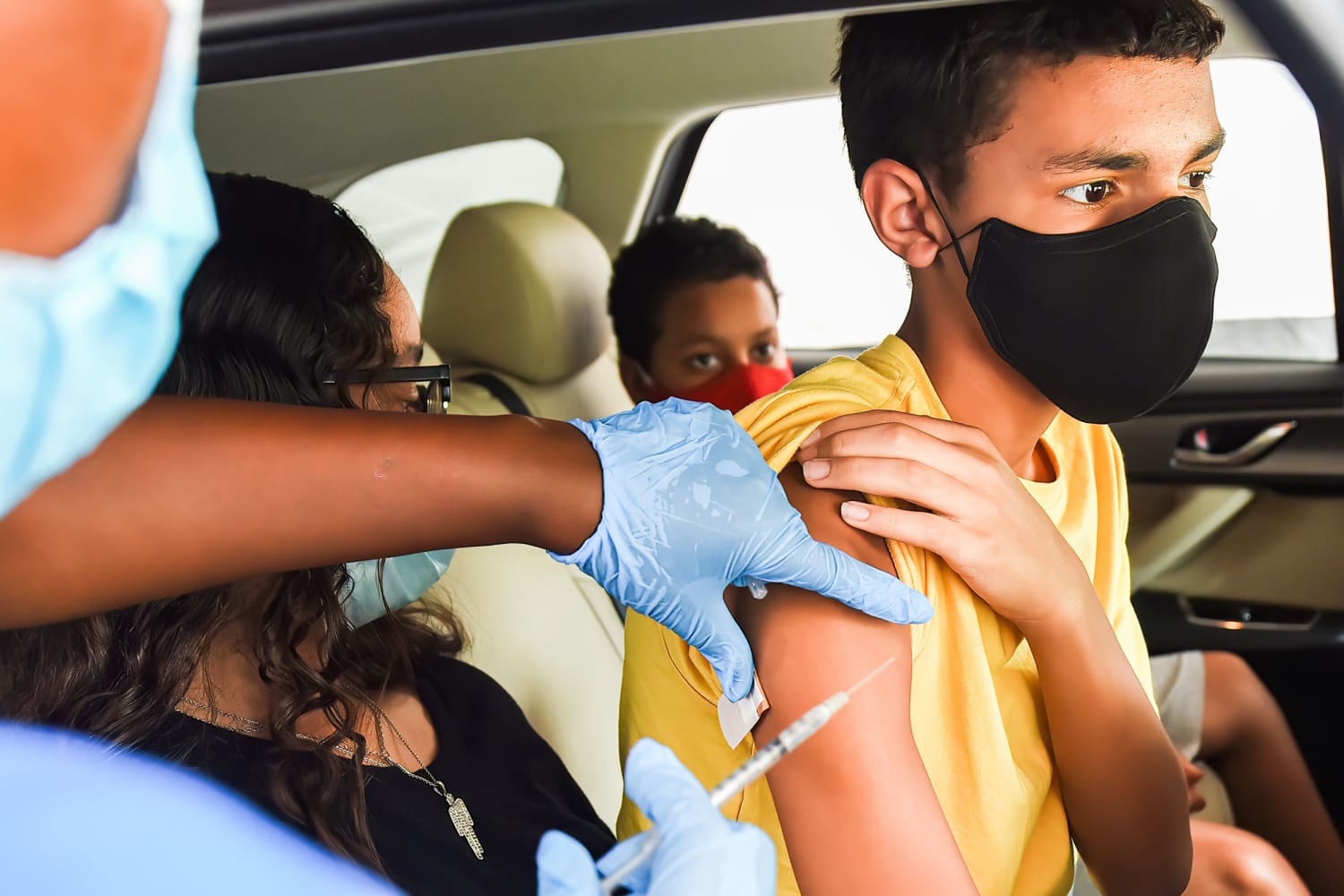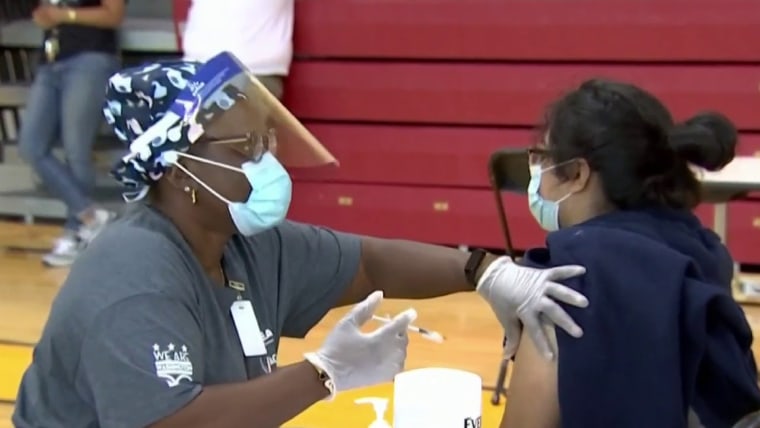Whether children receive a dose of a Covid-19 vaccine often depends on where they call home.
About 81 percent of children ages 12-17 in Vermont have received at least one dose of vaccine to protect against Covid-19, according to Centers for Disease Control and Prevention data analyzed by NBC News. Puerto Rico leads the U.S. with a vaccination rate of 91 percent.
But in West Virginia the rate is just 35 percent — a marker of stark regional disparities that are deepening across the nation.
The analysis, which tracks closely with a separate review of vaccine data by the American Academy of Pediatrics, suggests children are subject to some of the same geographic inequities as adults.
About 58 percent of eligible children nationwide have received at least one shot, but the rollout has stalled. Just 137,000 kids received a first shot last week — the second fewest in a week since April, according to academy of pediatrics data.
Children 16 and up became eligible for the Pfizer vaccine last December. Access was expanded to children ages 12 to 15 in May. The number of children receiving first shots has been on a downward trend since mid-August, the academy of pediatrics data says.
As the pace of vaccination slows among these young people, doctors say they’re battling deeply ingrained misconceptions that could leave many children unvaccinated and at heightened risk. Some parents internalized reassuring messages about kids’ risk early in the pandemic that aren’t true. Vaccine access and parents’ vaccine hesitancy are also issues.
Children now represent about a quarter of all new Covid cases in the U.S. Polling suggests that doctors and health officials could face an uphill battle to convince parents of children ages 5 through 11 to pursue the vaccine, which could be crucial to easing the pandemic.
The majority of children in 17 states who are eligible for a vaccine remain unvaccinated, NBC News data analysis shows. Southeastern states like Mississippi, Tennessee and Alabama are among those at the bottom of the list, with vaccination rates that have yet to top 40 percent.
Northeastern states like Vermont, Massachusetts and Connecticut report some of the highest rates in the nation.
The root of why some communities have fallen behind on kids’ Covid vaccinations harkens to the pandemic’s earliest days, when scientists were making educated guesses about the virus’ behavior, news flowed in a deluge and concerned parents couldn’t stop clicking on news stories.
In the first months of the pandemic in the U.S., few children were testing positive, becoming hospitalized or dying from Covid.
Testing was also in its infancy and supply shortages often meant only the sickest received testing. Then, many U.S. communities tumbled into lockdown, keeping children out of school, in their houses and, for many, away from the virus.
Researchers weren’t sure if kids weren’t getting the virus or just didn’t experience, on the whole, the most acute and attention-drawing effects of the illness. Children weren’t showing up in the data, giving some parents a sense that they weren’t at risk.
“In the beginning of the pandemic, there was a lot of misinformation. How kids are just immune. Adults will get it, but their kids are just fine,” said Anisa Ibrahim, a pediatric doctor at Harborview Medical Center in Seattle and an associate professor of pediatrics at the University of Washington. Now, “that’s the kind of messaging we’re trying to combat.”
While children are not being hospitalized or killed by Covid at the same rate as adults, they can contract it, spread the disease and suffer grave consequences, including death. Doctors say it’s hard to know how an individual child’s infection will play out.
“It’s difficult to predict who will get incredibly sick and who will not among young, healthy people,” Ibrahim said.
Nearly 6.3 million children in the U.S. have tested positive for Covid-19, and at least 584 of them have died, according to data from the American Academy of Pediatrics.
But doctors and researchers have said that the idea that kids are less susceptible to the virus and therefore don’t need the vaccine has persisted among some parents.
“Those early messages were sticky,” said Jessica Calarco, a researcher and associate pofessor of sociology at Indiana University who has periodically interviewed 80 mothers since 2018 and evaluated their decisions about vaccination.
Calarco argues, in an academic paper awaiting peer review, that reassuring messages from public health officials, the Centers for Disease Control and Prevention and the news media created a “sense of moral calm” over the risks of Covid, sapping some parents’ urgency today.
Now, researchers have a more accurate understanding of the risks of Covid, and they’re sharing that message. But many parents told Calarco they’ve tuned out Covid news since the initial flood of information.
“They’ve come to feel very fatigued,” Calarco said of parents. “One mom I talked to said she stuck her head in the sand and she’s not paying attention to Covid anymore.”
That opens the door to misinformation and vaccine hesitancy, Calarco said.
Other factors are at work, too, said Dr. Melissa Stockwell, who heads the division of child and adolescent health at Columbia University’s Irving Medical Center. Some states have access problems that can make it difficult for families to get their children to vaccine clinics at convenient times.
Disinformation on social media is also helping spur vaccine hesitancy. Some people have seen or experienced medical racism that causes distrust of the medical community. Language can be an information barrier and it’s important to meet people where they are.
“We take for granted that we can turn on NPR and NBC and watch something in English and know,” said Ibrahim, who conducts events in the Somali language in Seattle to reach members of that community.
Polling in August by the Kaiser Family Foundation found that Hispanic and Black parents were more likely to have concerns about barriers to vaccine access.
Unvaccinated children are at risk in several ways, Stockwell said.
“When the coverage is 35 percent, the children in that community don’t have the same level of protection as at 80 percent,” Stockwell said. “It matters for their own health, but it also matters for getting back to normal as we can get at this point. It’s really hard for kids to be out of school for so long.”
Doctors said no single approach will work to boost vaccination in this age group.
“There’s no blanket statement,” Ibrahim said.
The doctors said every office visit is a chance to bring up vaccines, connect with parents and assuage fears.
“The tide is going to be turned one by one, family by family,” Stockwell said.
The next wave of new vaccinations could prove to be challenging, however.
The White House has told governors this month to expect vaccinations to begin for children ages 5 through 11 early next month. A federal advisory committee was scheduled to review data from Pfizer clinical trials in younger children on Tuesday.
An FDA review of Pfizer’s data said the vaccine’s benefits “would clearly outweigh” its risks with no unexpected side effects. The FDA did model the impact of an extremely rare side effect, heart inflammation, in several scenarios. Only if cases fell to their lowest since the pandemic began would there be any question of whether the benefits of vaccinating this group outweigh the risks, the agency found.
But only a third of parents said they would immediately seek vaccination for kids 5 to 11, according to Kaiser Family Foundation polling. Ibrahim expects some parents of younger children to take a bit more time and proceed warily.
“I can anticipate these decisions being slower because we are asking parents to make decisions for their prized possession — their children,” Ibrahim said.
Source: | This article originally belongs to Nbcnews.com











